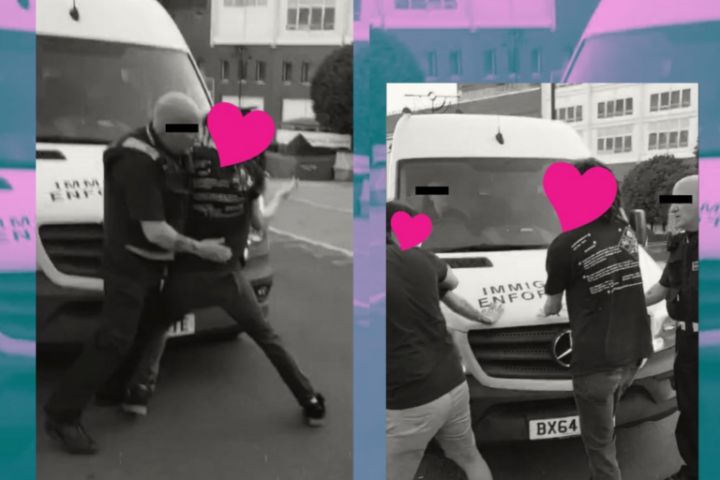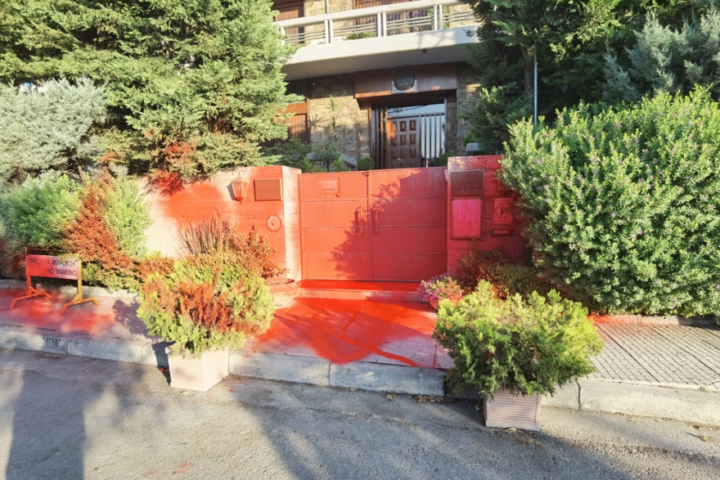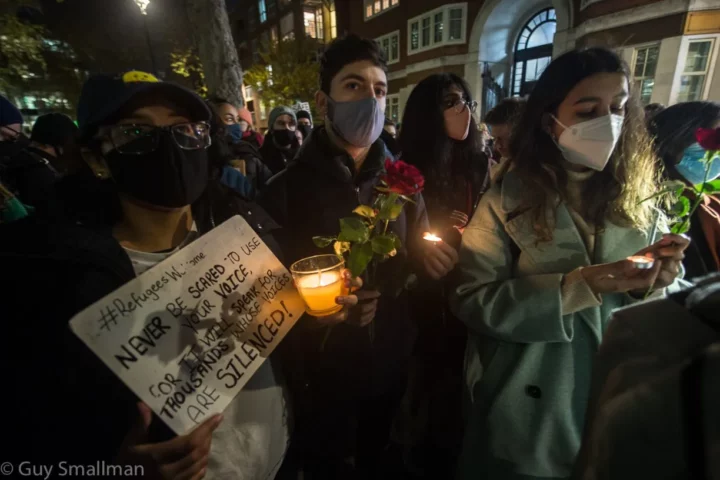As the coronavirus pandemic continues to affect people’s lives all over the world, the violence against migrants and refugees has intensified. This article explores #CoronaCapitalism and the Border Regime in a European context. Corporate Watch uses the term “border regime” as a shorthand to mean all of the many different institutions, people, systems and processes involved in trying to control migrants.
This article only shares the tip-of-the-iceberg of migrant experiences during the coronavirus pandemic and we know there are many other untold stories. If you would like to share your news or experiences, please contact us.
Content warning: This article contains some graphic references to state violence, such as police beatings.
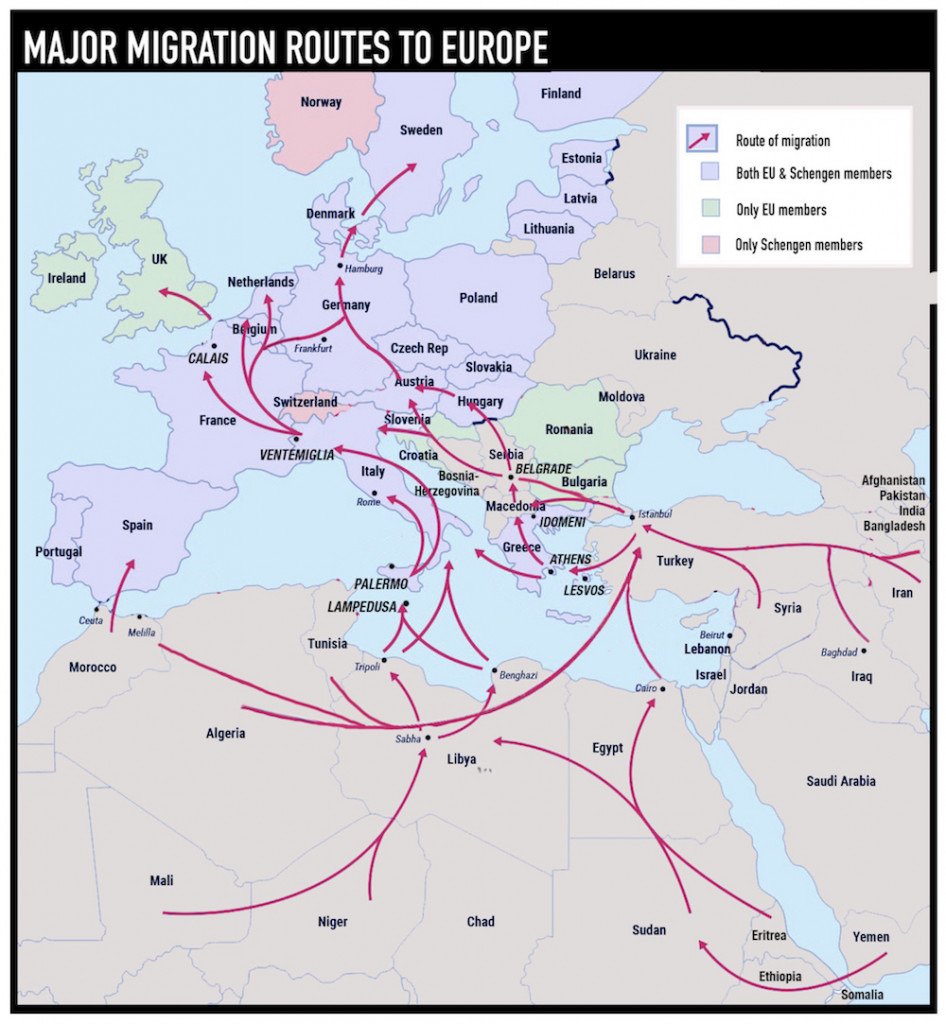
From No Name Kitchen featured in the Border Violence Monitoring Project special report about COVID-19 and border violence along the Balkan route
Mass Containment Camps
As the world descended into lockdowns in an attempt to prevent the spread of the virus, tens of thousands of people have been confined in camps in the Western Balkans and Greece, as well as smaller accommodation centres across Europe. New and existing camps were also essentially locked down and the movement of people in and out of camps began to be heavily controlled by police and/or the military.
The Border Violence Monitoring Network (BVMN) has been trying to track what is happening across the Balkans. They write that in Bosnia-Herzegovina, “more than 5,000 people were detained in existing temporary refugee reception centres. They include about 500 unaccompanied minors and several hundred children with families. Persons in need of special care, patients, victims of torture, members of the LGBTQ population, persons diagnosed with mental disorders, and victims of domestic violence have also been locked down into ‘EU-funded’ camps.” Police officers guard the centres and emergency legislation enables them the right to ‘physically force persons trying to leave the centres to return.’
120,000 people are locked down in containment camps across Greece and the Greek Islands. Disturbing accounts of refugee camps are ever-present but the pandemic has worsened already unbearable conditions. 17,000 refugees live at Moira Refugee Camp where there are 210 people per toilet and 630 people per shower. Coronavirus, uncertainty over suspended asylum applications and the terrible living conditions are all contributing to escalating violence.
In detention centres in Drama and Athens in Greece, the BVMN report that, “Respondents describe a lack of basic amenities such as running water, showers, or soap. Cramped and overcrowded conditions, with up to 13 inmates housed in one caravan with one, usually non-functioning, toilet. Requests for better services are met with violence at the hands of officers and riot police. On top of this, there have been complaints that no special precautions for COVID-19 are being taken, residents inside told BVMN reporters that sick individuals are not isolated, and are dismissed as having ‘the flu’.”
While movement restrictions were lifted for Greek residents on 4th May, lockdown is still extended for all camps and centres across Greece and the Islands. This decision triggered thousands of people to protest in Athens. Emergency legislation adopted at the start of March in Greece effectively suspended the registration of asylum applications and implied immediate deportation for those entering the Greek territory, without registration, to their countries of origin or to Turkey.
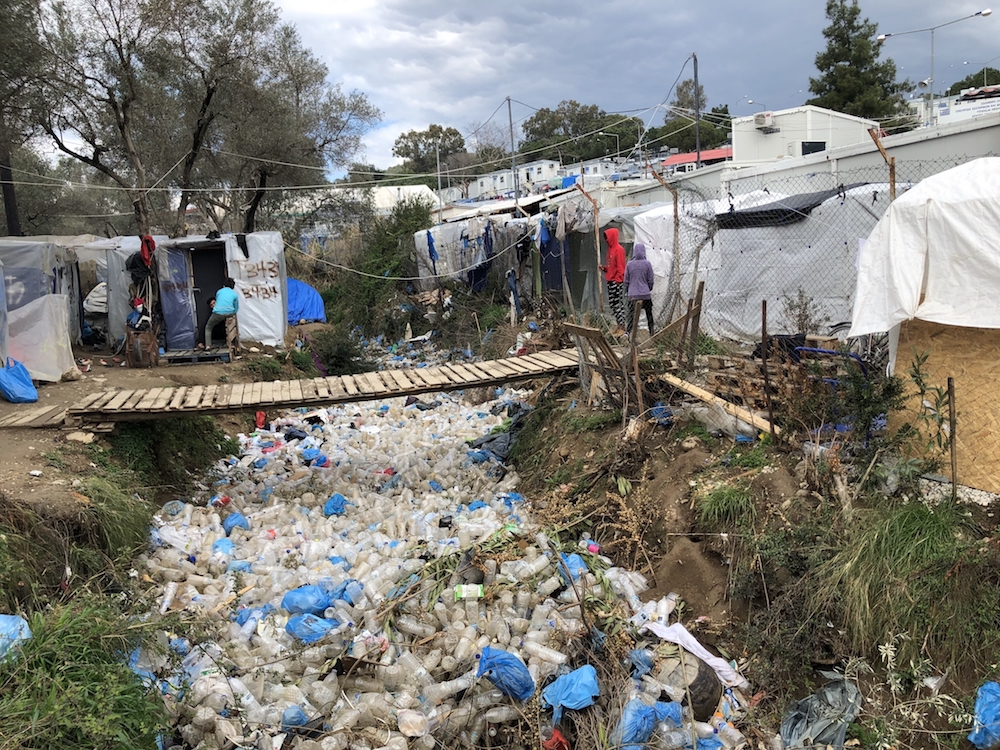
Moira Refugee Camp. Picture from Lydia Emmanouilidou/The World – https://www.pri.org/stories/2020-03-16/life-goes-greek-refugee-camp-amid-diplomatic-tensions-and-pandemic
Detention and the deportation regime
While major country-wide lockdowns are an unusual form of restriction of movement, for decades European states have been locking people seeking safety in detention centres. Immigration Removal Centres are essentially prisons for migrants in which people are locked up without trial or time-limit. In the UK the detention system is mostly run for profit by private companies, as detailed in our UK Border Regime book.
Despite preparing for a pandemic scenario in January 2020, it took public pressure and legal action before the British government released nearly 1000 people from detention centres. As of the end of May, 368 people were still locked up in the profit-making detention centres and many more are living in ‘accommodation centres’ where they have been unable to access coronavirus testing.
During the pandemic, people have been revolting in several detention centres across France and Belgium. Residents at a refugee centre in Saxony-Anhalt in Germany went on a hunger strike in April to protest against a lack of disinfectant. Hunger strikes have also taken place at detention centres in Tunisia, Cyprus and France.
Women in a police holding centre for migrants in Greece went on hunger strike in June. In a statement, they wrote: “We will continue the hunger strike until we are free from this captivity. They will either set us free or we shall die”.
People staged a rooftop protest at a detention centre in Madrid at the start of the outbreak. This was before all the detention centres in Spain were, for the first time in their history, completely emptied. To put this into context, Spain had 6,473 detainees in 2019. Legal challenges have been leveraging the EU Returns Directive which allows detention pending deportation for up to 18 months, but stipulates that if “a reasonable prospect of removal no longer exists…detention ceases to be justified and the person concerned shall be released immediately”.
With a worldwide reduction in flights, deportations became unfeasible, however, many are afraid that the deportation machine will restart as things “return to normal”.
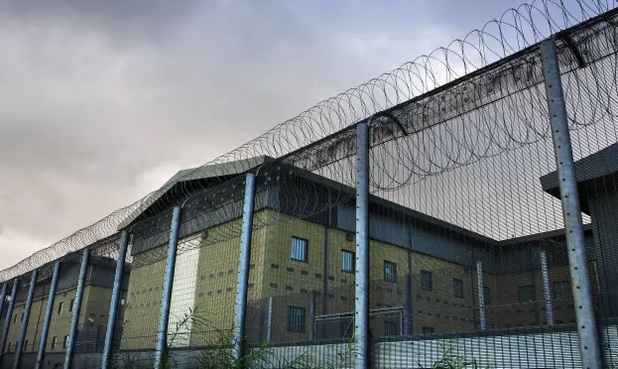
Picture from Adrian Dennis/AFP/Getty Images
Worsening life in the ‘jungle’
People living in squats and other improvised accommodation have also faced sweeping operations, with people being rounded up and taken to containment camps.
For those that remained on the street, pandemic restrictions took their toll. In Greece, movement amidst the pandemic was permitted via letters and text messages. For people who did not have the right paperwork, they were fined 150 euros, sometimes multiple times.
Similarly, in the French city of Calais, people who did not have the right paperwork were commonly denied access to shops and supermarkets, where they may have previously used the bathrooms or bought food to cook. With many volunteer groups unable to operate due to movement restrictions, the availability of food dramatically reduced overnight. Access to services such as showers, phone charging and healthcare also rapidly reduced.
People in Calais also faced a rise in evictions: 45 evictions were recorded in the first two weeks of lockdown. These expulsions have continued throughout the pandemic. On Friday 10th July 2020, a major police raid in Calais forced more than 500 people onto buses to be taken to ‘reception centres’ across the region.
In Amsterdam in the Netherlands, some migrants were forced to live in night shelters and made to leave during the daytime – facing constant risks of contracting COVID-19 and police harassment in the city. They protested “I would stay at home if I had one”.
Many migrant solidarity groups working on the ground lost huge numbers of volunteers due to travel restrictions and health concerns. Access to material donations such as tents, which are commonly collected at the end of festivals, also reduced. A constant supply of these resources is needed because the police routinely take the migrants’ tents away.
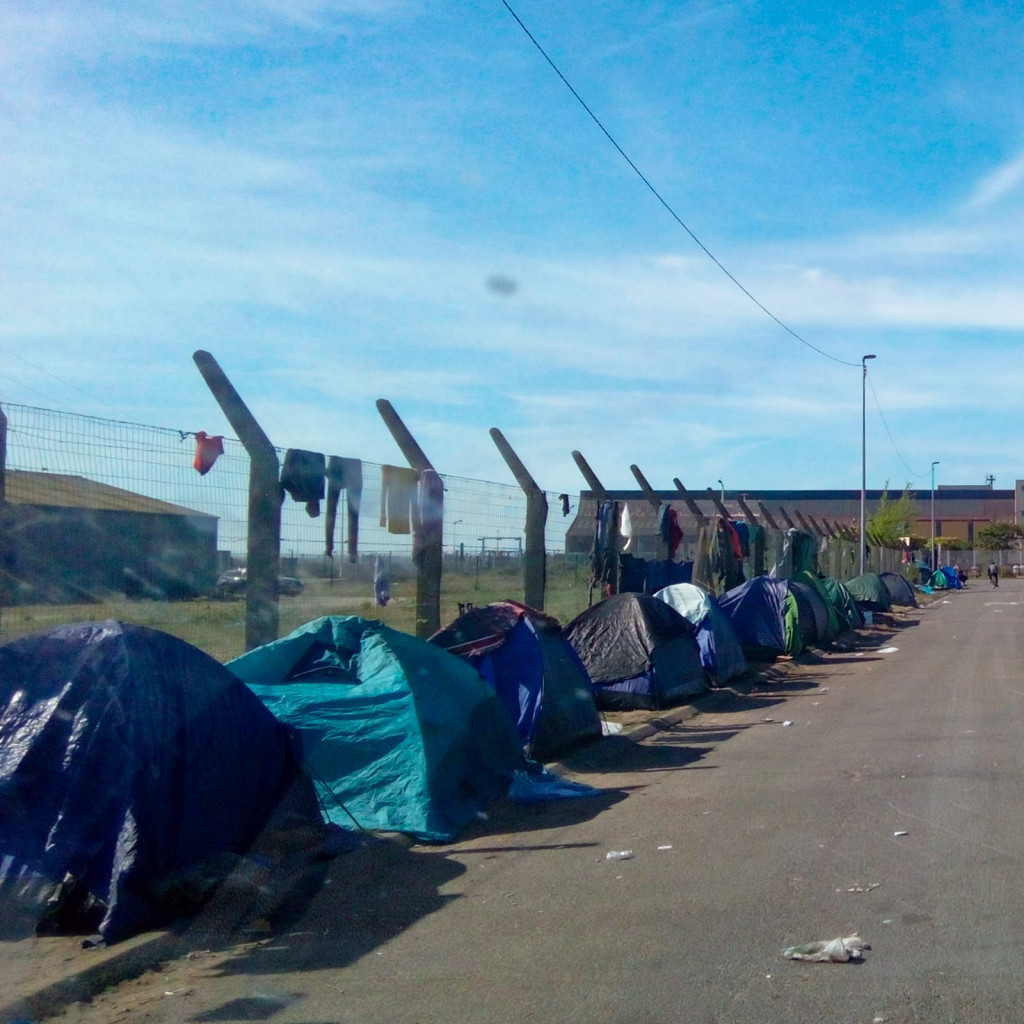
Encampments in Calais – image from Herbalists without Borders UK
Militarisation of borders
The pandemic has seen an increase in military forces at borders and camps, persistent police violence and the suspension of ‘rights’ or legal processes. Using ‘State of Emergency’ legislation, the health crisis has been effectively weaponised.
In March at the beginning of the pandemic in Europe, FRONTEX, the European Border and Coast Guard Agency deployed an additional 100 guards at the Greek Land Border. This is in addition to the agency’s core of 10,000 officers working around Europe.
In their 2020 Risk Analysis Report, FRONTEX wrote that “the closing of internal borders is binding border guard personnel, which some border authorities have long stopped planning for”. This illuminates a key complexity in border control. For years, Europe has shifted to policing the wider borders of the Schengen Area. As the virus spread between countries within that area, however, states have tried to shut down their own borders.
Police forces and militaries have become increasingly mobilised to “protect these national borders”. In Slovenia, this meant the military was granted authority to ‘process civilians’ at the border through the government’s activation of Article 37a of the Defence Act. While in Serbia, the army was deployed around border camps to ensure mass containment. 400 new border guards were also dispatched to the Evros land border between Greece and Turkey in addition to an increase in fencing and surveillance technologies.
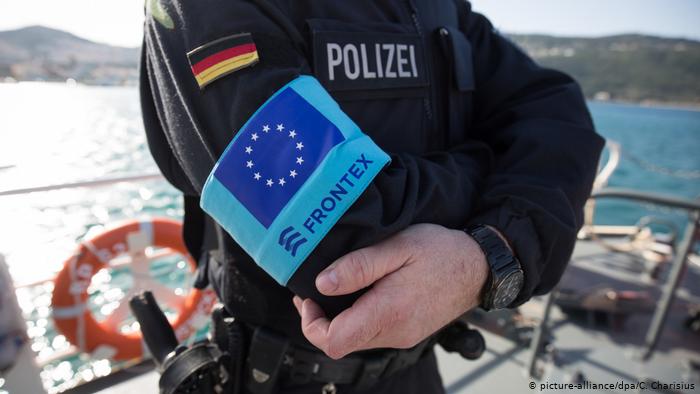
Escalating Police Violence
Although migrants are no strangers to police brutality, national states of emergency have enabled an escalation in police violence. In mid-April an open letter was published by the Eritrean community of the Calais jungle reporting escalating police brutality. It describes the actions of the CRS police (Compagnies républicaines de sécurité); the general guard of the French police, infamous for riot control and repression:
“They don’t see us as human beings. They insult us with names such as monkey, bitch etc. And for the past few weeks, they have started to threaten our lives by beating us as soon as the opportunity arises. When for example they found a group of two or three people walking towards the food distribution, or in our tents, when we were sleeping. They accelerate in their vehicles while driving in our direction, as if they wanted to crush us. They also took people with them to places far from Calais, and beat them until they lost consciousness.”
The statement continues with a chronological list of events whereby people were beaten up, hit, gassed, had their arms broken, and were struck on the head so hard they lost consciousness and were taken to hospital by ambulance.
With fewer people on the streets during the pandemic, police evictions that were not previously possible due to street-level resistance became successful. This was evidenced in the eviction of the Gini occupation at the Polytechnic University in Exarchia, Greece, a location that the police have not dared enter for decades. Dozens of migrant families were rounded up and taken to a detention centre.
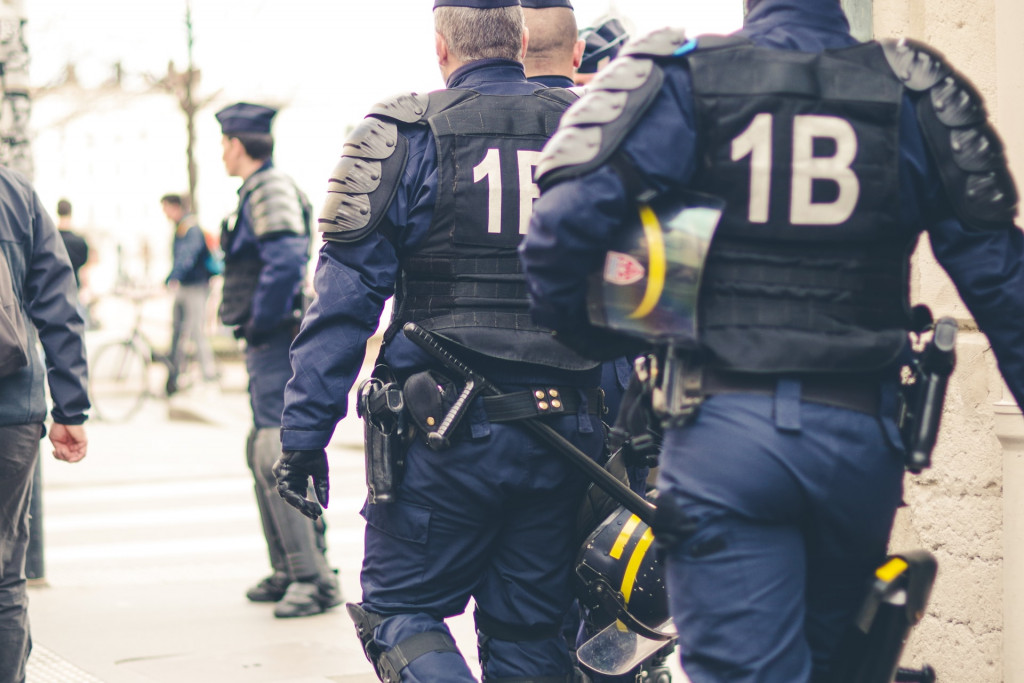
Violent pushbacks across borders
There has also been an increase in illegal and violent pushbacks. Pushbacks are the informal expulsion (without due process) of individuals or groups to another country. This commonly involves the violent removal of people across a border.
For example, on April 22nd in North Macedonia, a group of people from Palestine, Morocco and Egypt were pushed back into Greece. Two men were approached by officers in army uniforms and forced onto a bus where officers began to beat them with batons and guns. So much force was used that one man’s arm was fractured. The other members of the small group were later found and abruptly woken by officers. One man was stamped on and kicked across his body and head. Their shoes were removed and they were told to walk the 2km back to the border where they were met with the other group that had been taken there.
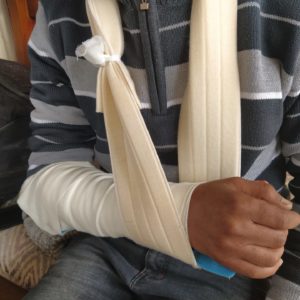
Photograph of fractured arm after being treated by a medical volunteer in Thessaloniki. Picture from – https://www.borderviolence.eu/violence-reports/april-22-2020-0200-gevgelia/
A group of 16 people in Serbia (including one minor) were told they were being taken to a new camp for COVID prevention. They were then forced into a van and driven for nine hours with no stops, toilet or water. They were released at a remote area of hills and told to leave and cross the border to North Macedonia by the officers with guns. When found attempting to cross again days later they were told by police officers, “Don’t come again, we will kill you”.
In Croatia, police have also started tagging people that they have pushed back with orange spray paint.
There are also reports that Greek authorities are pushing people back to Turkey. According to the Border Violence Monitoring Network, many people shared experiences of being beaten, robbed and detained before being driven to the border area where military personnel used boats to return them to Turkey across the Evros river. In mid April in Greece, approximately 50 people were taken from Diavata camp in the morning and removed to a nearby police station where they were ordered to lie on the ground – “Sleep here, don’t move”. They were then beaten with batons. Some were also attacked with electric tasers. They were held overnight in a detention space near the border, and beaten further by Greek military officers. The next day they were boated across the river to Turkey by authorities with military uniforms. Another group were taken to the river in the dark and ordered to strip to their underwear.
As pushbacks continue, people are forced to take even more dangerous routes. In Romania in mid-April, a group were found drowning in the Danube River after their boat capsized. One person was found dead and eight are still missing, while the survivors suffered from hypothermia.
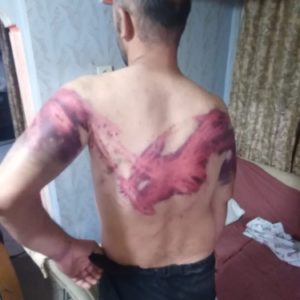
Bruising from a beating by police during a pushback from Greece to Turkey. Image from – https://www.borderviolence.eu/violence-reports/june-21-2020-2100-ipsala-edirne-turkey/
Danger at Sea
During the pandemic, increasing numbers of disturbing accounts have been shared by migrants experiencing violence at sea. Between mid March and mid May, Alarm Phone (a hotline for boat people in distress) received 28 emergency calls from the Aegean Sea.
On the 29th April, a boat carrying 48 refugees from Afghanistan, Congo and Iran, including 18 children, tried to reach Lesvos Island in the early hours of the day. They were pushed back to Turkish waters:
“We were very scared. We tried to continue towards Lesvos Island. It was only 20 minutes more driving to reach the Greek coast. The big boat let a highspeed boat down, which hunted us down. There were six masked men in black clothes. They stopped us and made many waves. With a long stick they took away our petrol and they broke our engine. They had guns and knives. Then they threw a rope to us and ordered us to fix it on our boat. Then they started pulling us back towards Turkey. After a while they stopped and cut the rope. They returned to the big boat and took distance from us. It was around 6am.
Then two other boats of the Greek coastguard arrived which were white and grey and drove very fast towards us, starting to make circles around our boat. They created big waves which were pushing us in the direction of Turkish waters. Our boat was taking in water and the kids were screaming. Our boat started breaking from the bottom. We were taking out the water with our boots. We threw all our belongings in the sea to make our boat lighter. Many of us had no life vests. A pregnant lady fainted. The Greeks continued making waves for a long period. A Turkish coastguard boat arrived and stood aside watching and taking photos and videos for more than six hours. Only after 13:30 o’clock the Turkish coastguard boat finally saved us. We were brought to Çanakalle police station and detained for five days.”
During two months of lockdown, civil monitoring ships (volunteers who monitor the Aegean sea for migrants arriving via boat) were not permitted. In Italy, ports were closed to rescue ships, with many feared lost at sea as a result. Allegations have also emerged that Greece has been using inflatable rafts to deport asylum seekers. These are rafts without motors or propellers that cannot be steered.
The Maltese Army also hit the headlines after turning away a boat of migrants by gunpoint and giving them the GPS coordinates for Italy. This is after recent reports of sabotaging migrant vessels, and pushing back migrant boats to Libya resulting in 12 people dying. The Maltese government recently signed a deal with the Libyan government to “to coordinate operations against illegal migration”. This includes training the Libyan coastguards and funding for “reception camps”.
The threat of the virus and worsening conditions have also contributed to a record number of attempts to cross the Channel. The courage and commitment to overcome borders is inspiring, and more successful crossings have taken place during the pandemic. Between March 23rd (when the UK coronavirus lockdown began) and May 11th at least 853 migrants managed to cross the Channel in dinghies and small boats.
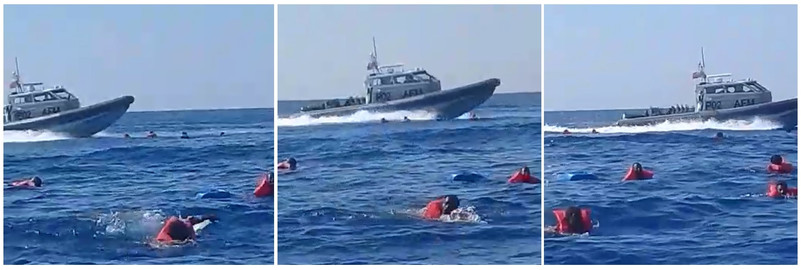
Image from https://alarmphone.org of the Maltese coastguard antagonising people in need of rescue at sea in May 2020
State Scapegoating and the empowerment of the far right
Far-right politicians and fascist activists have used the pandemic as an opportunity to push for closed borders.
The election of a new Far Right government in Slovenia in March brought with it the scapegoating of refugees as coronavirus vectors. News conglomerate, NOVA24, heavily publicised a fake news story that the first COVID-19 patient in Italy was a Pakistani person who came via the Balkan route.
Meanwhile, Hungary’s Government led by Vicktor Orbán moved to deport resident Iranians after claiming they were responsible for the country’s first coronavirus outbreak.
In Italy, Matteo Salvini, the populist leader of the opposition Lega party tried to blame the movement of migrants from Africa across the Mediterranean as a “major infection threat” shortly before the country was overwhelmed with the pandemic and its rising death toll.
The racist scapegoating ignores data that proves that initially the virus was transmited predominatnly by tourists’ and business people’s globe-trotting in the service of global capitalism and the fact that those whose movement is restricted, controlled and perilous, who do not have the power and wealth, are the most likely to suffer from the worst effects of both the virus itself and the shut downs.
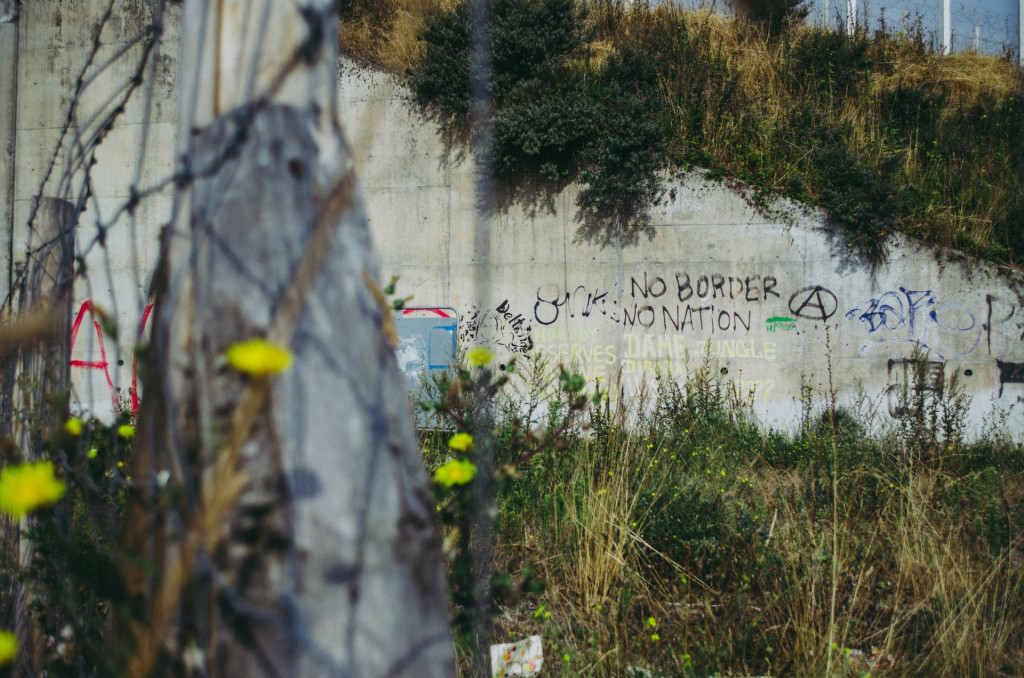
Photo by Radek Homola on Unsplash
The Aftermath of Asylum suspension
Access to asylum has drastically shifted across Europe with the suspension of many face-to-face application processing centres and appeal hearings. This ‘legal limbo’ is having a severe impact on people’s lives.
Many people remain housed in temporary accommodation like hotels while they wait for their claim to be processed. This accommodation is often overcrowded and social-distancing guidelines are impossible to follow there. One asylum seeker in South London even shared to The Guardian how two strangers were made to share his double bed for a week in one room. One of the people was later taken to hospital with coronavirus.
Closed-conditions at Skellig Accomodation Centre, a former hotel in Cahersiveen, Co. Kerry, Ireland enabled the rapid spread of the virus between the 100 people living there. Misha, an asylum seeker confined there, said she watched in horror as people started falling sick around her.
“We were sharing bedrooms with strangers. We were sharing the dining room. We were sharing the salt shakers. We were sharing the lobby. We were sharing everything. And if you looked at the whole situation, you cannot really say that it was fit for purpose.”
People were ordered to stay inside, and meanwhile coronavirus testing was delayed. Protests took place inside and locals demonstrated in solidarity outside.
Asylum seekers in Glasgow have been protesting their accommodation conditions provided by the Mears Group, who Corporate Watch profiled in 2019. Mears Group won a £1.15 billion contract to run the refugee accommodation system in Scotland, Northern Ireland and much of the north of England. Their profiteering, slum landlord conditions and involvement in mass evictions have been met with anger and resistance. The pandemic has only worsened the experiences of people forced to live in Mears’ accommodation through terrible sanitation and medical neglect. Read our 2020 update on the Mears Group here.
In the UK, the Home Office put a hold on evictions of asylum seekers during lockdown. The Red Cross stated this spared 50,000 people from the threat of losing their accommodation. Campaigners and tenants fear what will happen post-corona and how many people will face destitution when the ban on evictions lifts this August.
In addition, a face-to-face screening interview is still needed for new asylum claims. This creates an awful choice for asylum seekers between shielding from the virus (and facing destitution) or going to the interviews in order to access emergency asylum support and begin the formal process. While meagre, the £37.75 per week is essential for survival. One of the reasons the Home Office make face-to-face applications compulsory is because of biometric data harvesting e.g. taking fingerprints of asylum seekers. One asylum seeker with serious health problems has had to make three journeys from Glasgow to Liverpool in the midst of the pandemic to submit paperwork.
Access to food and other support is also very difficult as many centres and support services are closed.
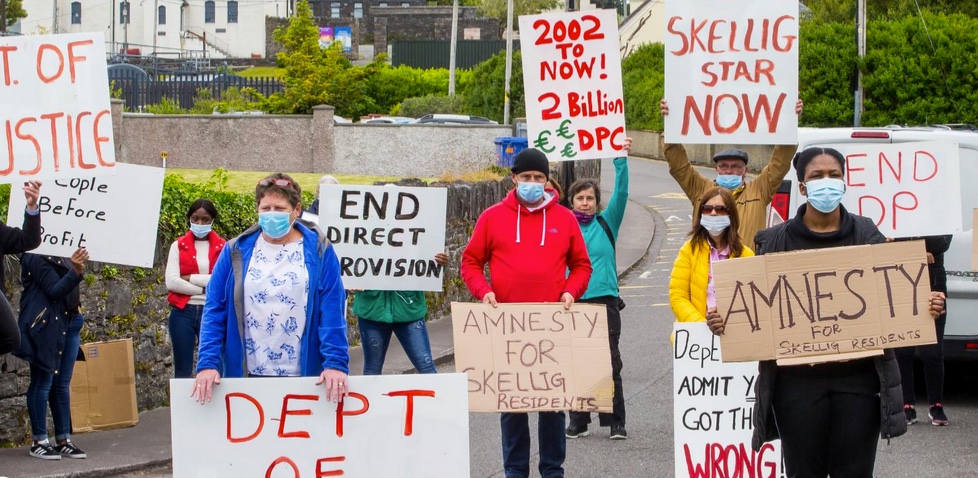
Demonstration in Cahersiveen in solidarity with people contained in Skellig Accomodation Centre. Photograph by from https://edition.cnn.com/2020/06/16/europe/ireland-asylum-direct-provision-coronavirus-intl/index.html
Barriers to Healthcare
It is widely recognised that systemic racism has led to the disproportionate deaths of Black, Asian and minority ethnic people throughout the pandemic. Research has shown Black people are four times more likely to die than white people, and Bangladeshi or Pakistani groups are three times more likely. Many people from these communities are migrants, and many work in the National Health Service and social care sector.
Research by Patients not Passports, Medact, Migrants Organise and the New Economics Foundation has shown that many migrants are avoiding seeking healthcare. 57% of respondents in their research report that they have avoided seeking healthcare because of fears of being charged for NHS care, data sharing and other migration enforcement concerns. Most people are unaware that treatment for coronavirus is exempt from charging. They also often experience additional barriers including the absence of translation and interpretation services, digital exclusions, housing and long distances from care services.
Undocumented migrants are incredibly precarious. A project worker interviewed for the Patients not Passports Report shared that:
“One client lived in a care home where she does live-in care and she has been exposed to Corona but has stated that she will not seek treatment and would rather die there than be detained.”
Elvis, an undocumented migrant from the Philippines, died at home with suspected coronavirus because he was so scared by the hostility of Government policies that he did not seek any help from the NHS.
For those that do try to access healthcare, issues such as not having enough phone credit or mobile data, not having wifi or laptops for video appointments, and simply not being able to navigate automated telephone and online systems because of language barriers and non-existent or poor translation, are having a very real impact on people’s ability to receive support. Fears of poor treatment because of people’s past experiences of discrimination and racism even if they access the services is another barrier.
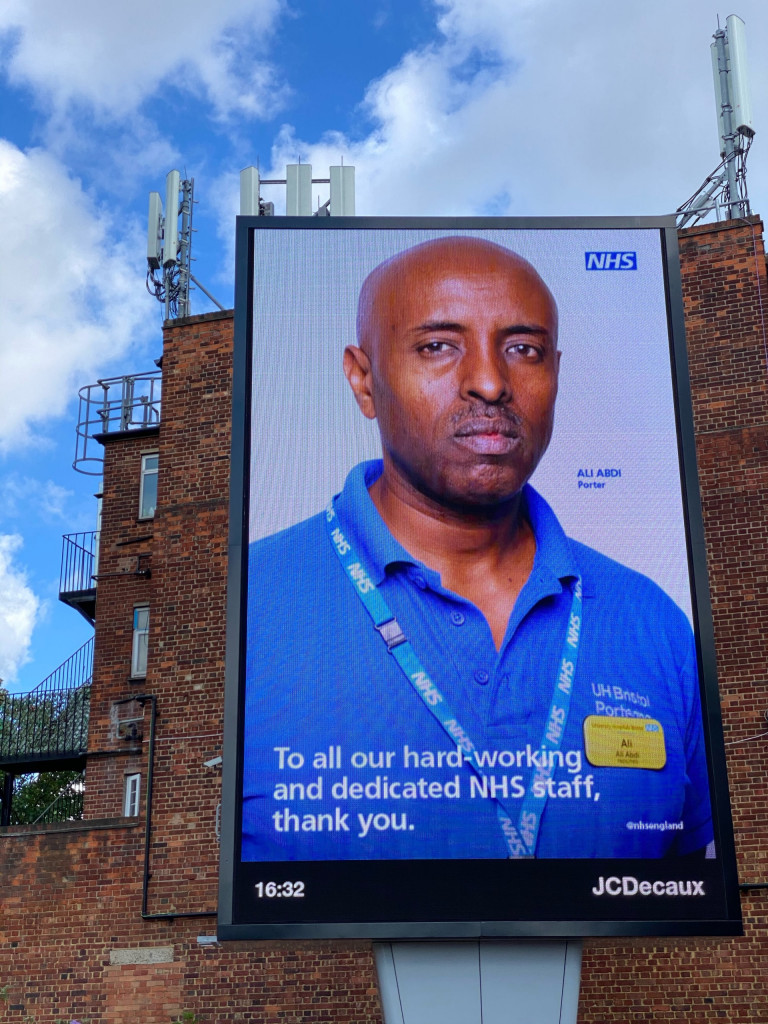
Photo by John Cameron on Unsplash
Exploiting Migrant Labour
The exploitation of migrant labour has always been essential to sustaining capitalist economies. The pandemic generated contradictory responses from politicians and capitalists alike. Germany’s agricultural sector lobbied hard for opening the border after they were closed, leading the country to lift its ban and let in over 80,000 seasonal workers from Eastern Europe. Yet dilapidated living conditions and overcrowding are sparking new COVID-19 outbreaks, such as the 200 workers that contracted the virus at a slaughterhouse in western Germany.
In mid May, the Italian government passed a law regularising undocumented migrants, whereby undocumented workers have been encouraged to apply for six-month legal residency permits. There are believed to be about 600,000 undocumented workers in Italy but only people doing ‘essential’ work during the pandemic can apply, mostly in the agricultural sector. Thousands of people live in makeshift encampments near fruit and vegetable farms with no access to running water or electricity.
Working conditions carry risks of violence. On 18 May, five days after Italy’s regularisation law passed, a 33-year old Indian migrant working in a field outside of Rome was fired after asking his employer for a face mask for protection while at work. When the worker requested his daily wage, he was beaten up and thrown in a nearby canal.
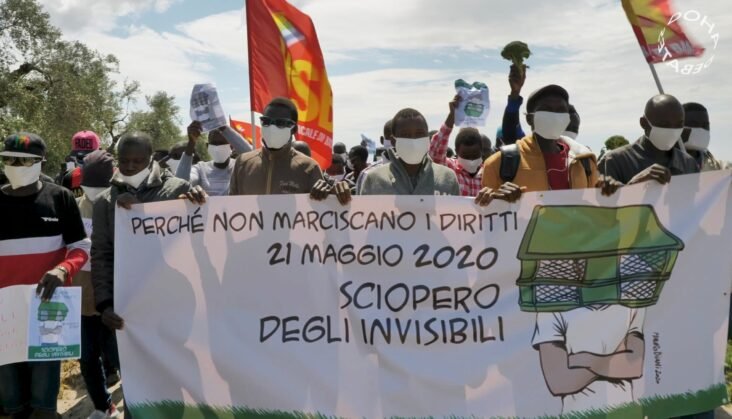
Image from a new documentary about migrant labour struggles in Italy from – https://www.theafricareport.com/32086/the-invisibles-unseen-footage-of-italys-migrant-labourers-at-peak-of-covid-19/
Conclusion
The coronavirus crisis has exposed and intensified the brutality required to sustain capitalism – from systemic racism, to violent border controls, to slave labour for industrial agriculture, the list goes on. Despite extremely difficult conditions, undocumented migrants have formed strong movements of solidarity and collective struggle in many European countries. From revolts in detention centres to legal actions to empty them, people are continually resisting the border regime. As people reject a ‘return to normal’ post pandemic, the fall of the border regime must be part of a vision for freedom and liberation in a world beyond capitalism.
To download a free copy or order a hard copy of our book The UK Border Regime click here.
NB: we will be glad to send copies for free to asylum seekers and other people without papers. For other people and groups fighting the border regime, we can send at cost price or whatever you can afford to donate.


